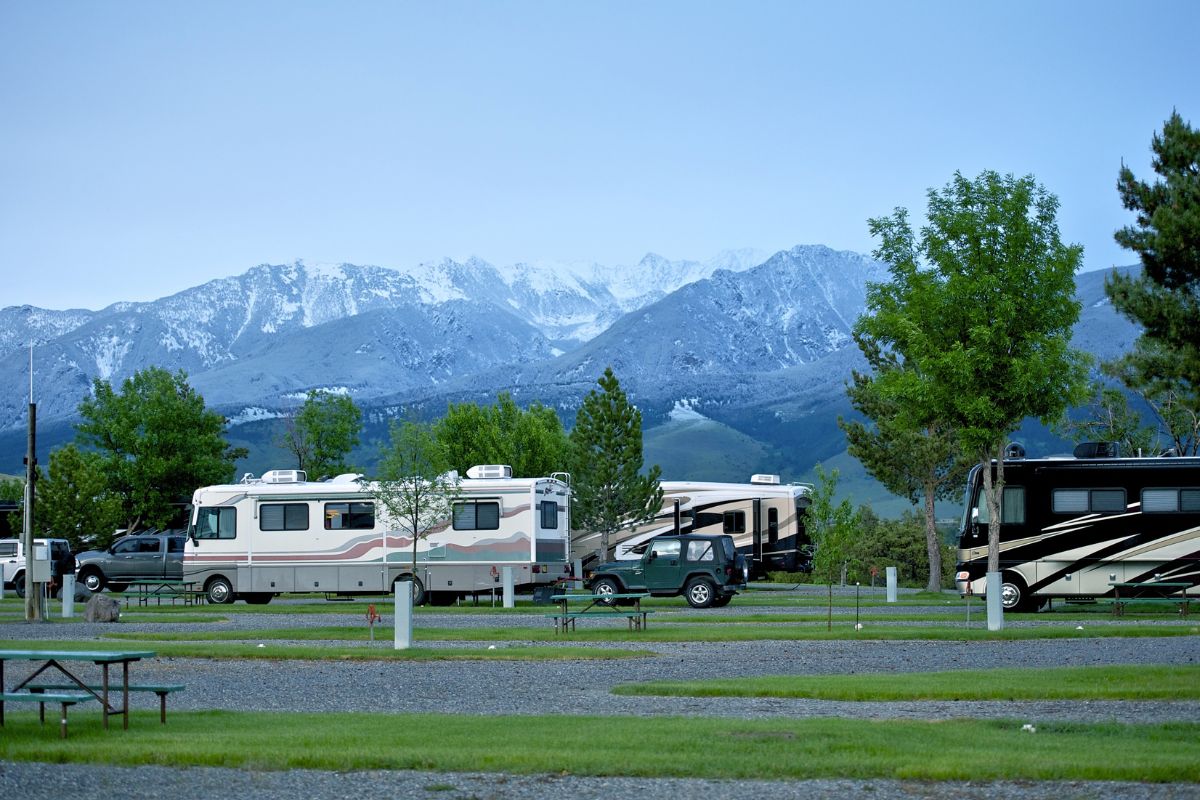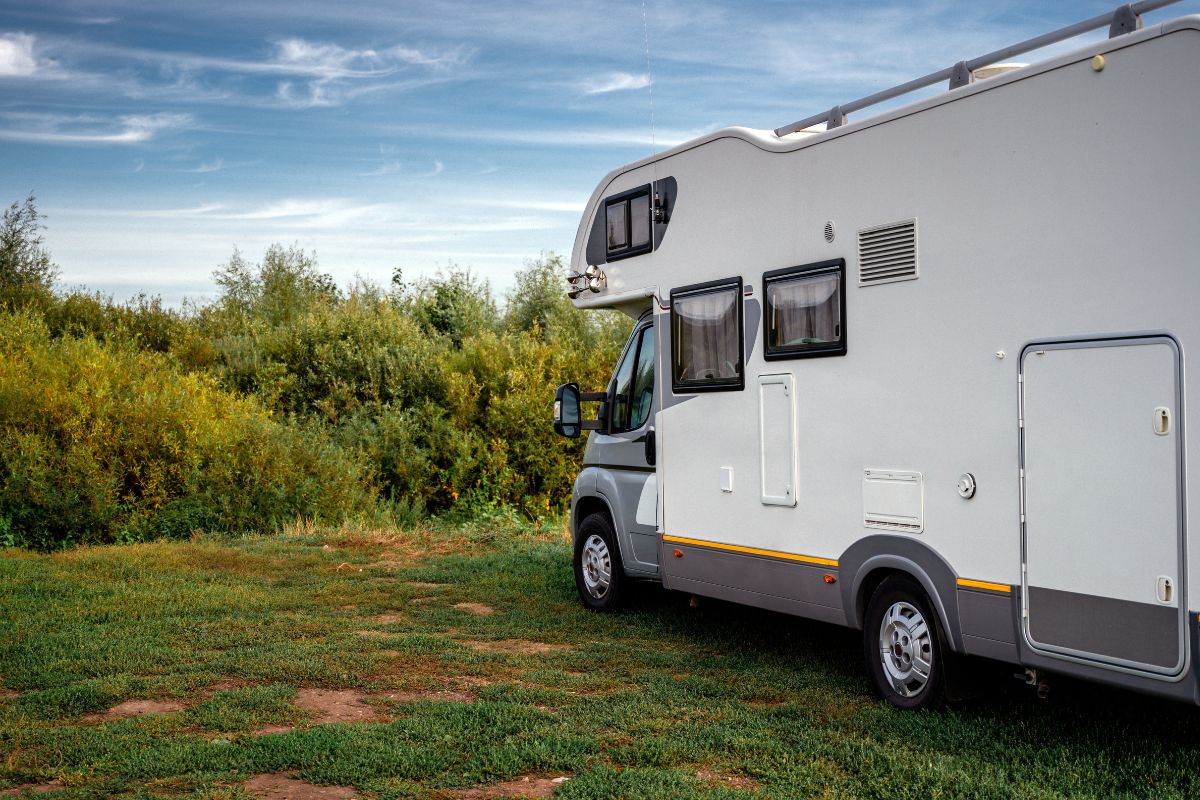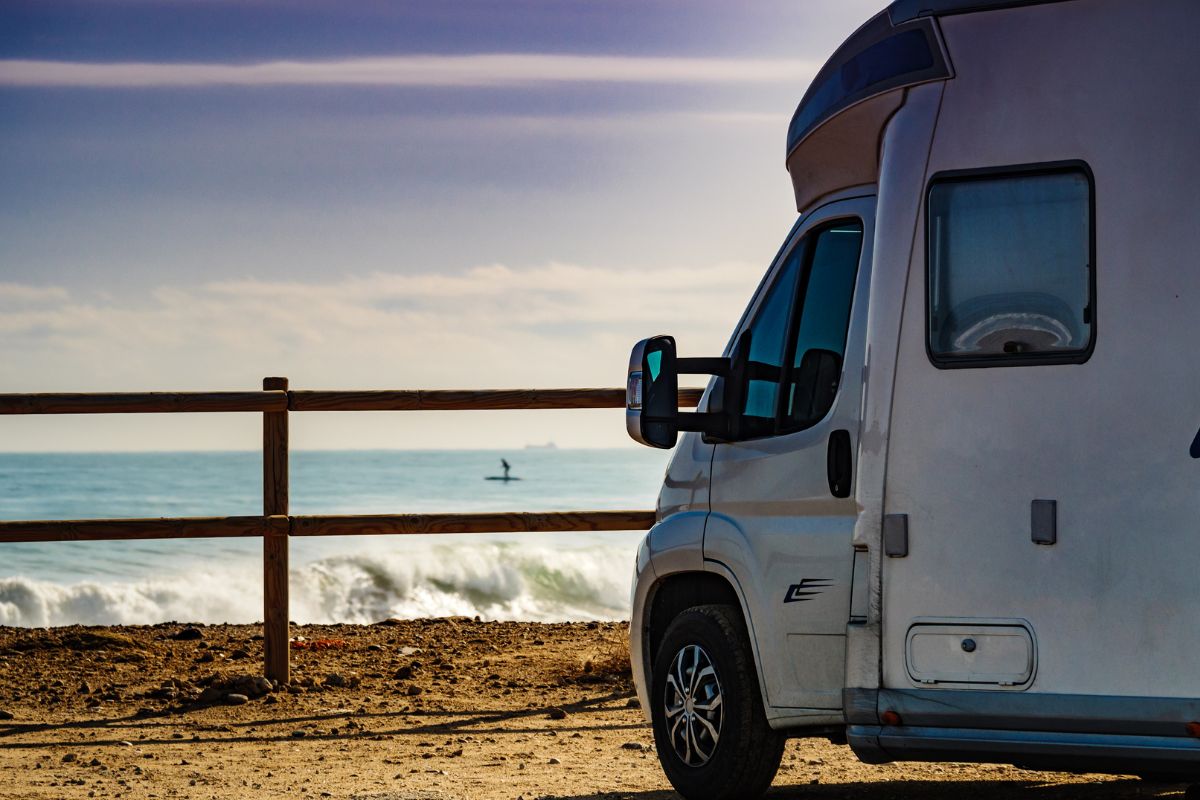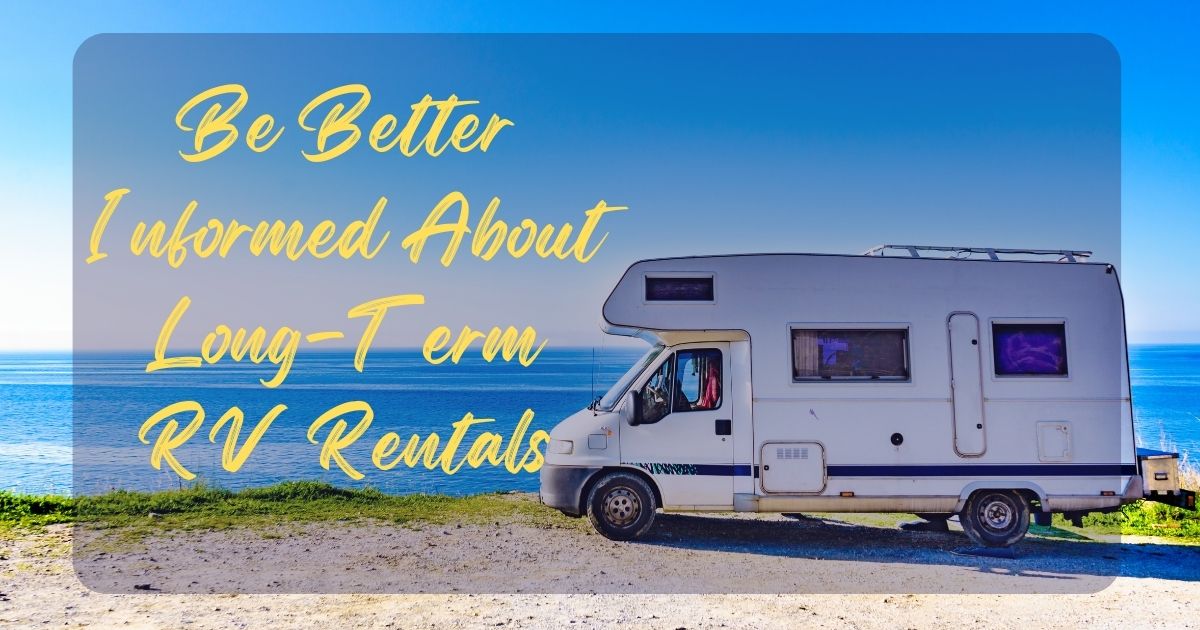What is Considered a Long-Term RV Rental?
Many people aim to spend most of their time in an RV. The good news is that realizing that desire is becoming simpler due to the availability of long-term RV rentals in major towns.
Full-time RV life is no longer just an option offered to retirees. So if you’ve considered getting ready and embarking on a grand journey, keep reading. This article contains all the information required to live the full-time RVing dream.

How to Find Long-Term RV Rental Deals
Are you looking for an RV for long-term living? Peer-to-peer rental marketplaces are the greatest option for a monthly RV rental. You can rent an RV from reputable RV owners, and each rental comes with free roadside assistance and insurance up to around $1 million.
On their platform, finding a monthly RV rental is simple. Just go to their website, and enter the dates and the city or state where you’ll be staying. Along with the price, you can filter your results based on features, customer reviews, the number of people an RV can sleep, and even certain keywords (such as “luxury” or “monthly RV rental”).
Once you find a reliable RV for long-term living, think about contacting the RV owner to see if you can work something out.
It is a good idea sometimes to find long-term RV rentals by owners on different websites. You may frequently persuade them to reduce their rates for long-term tenants. While many RV owners may haggle with you, the price listed on the website is merely their standard price.
We recommend reading customer reviews before making a purchase. These reviews, similar to Airbnb, can let you know if the owner is friendly and whether or not their vehicle is in decent shape. Although most have a strict procedure to ensure that only reputable RV owners use their network, a rotten apple can occasionally get through.
The Cost of Renting an RV for a Month
Now that you’re thinking about it, you’re probably wondering how much it would cost to rent an RV for a month. Do I have that much money saved up? We studied typical RV rental rates in the US and discovered that they typically vary from approximately $50 to $200 per night.
However, you may get rates as low as around $50 per night or less when renting RVs for a long time (such as a monthly or even a year)!
Again, keep in mind that since RV owners are vying for your business, you can frequently negotiate with them. Many of them adore having a long-term RV rental because it spares them the hassle of needing to keep their calendars full to maintain their RV business profitable.
What do You Need in an RV for Long-Term Living?
You should consider everything you’ll need for RV living once you’ve decided to travel full-time. The correct equipment, furnishings, and accessories can be the difference between comfort and suffering. especially if you enjoy boondocking or are in a remote area.
Everybody has a different way of camping in an RV. However, most individuals find this list of essentials for full-time RV living useful for short and extended road trips.
An Attitude of Flexibility
Yes, when traveling, you should have a general plan. But sometimes, things go differently than planned. It’s possible that a natural calamity could obstruct your path, an appliance in your RV will break, or you’ll be having so much fun that you will be ready to pack up camp later.
Whatever the motivation, living in an RV full-time requires being adaptable and willing to change. Be willing to change your original plans. After all, RVing’s independence is one of its best features.
Connectivity
Although it’s great to unplug, you must remain connected if you’re working and residing in an RV full-time. There are some places where digital nomads can easily locate WiFi. Some people, not so much.
Additionally, it’s best to rely on something other than campground WiFi because the connections are only sometimes reliable. Have things like hotspot antennas and cell signal boosters instead. It’s also a good idea to have an extra battery pack to keep all your devices charged.
Sleeping Essentials
The number of sleeping essentials you need will depend on your RV’s heating and cooling systems, but you can ensure you have the following items:
- Blankets or sleeping bags
- Bedding and sheets
- Warm PJs
- Pillows
Kitchen Essentials
Although larger RVs will have more space, the following goods should fit in any size RV with a little organizing:
- Wine opener
- Can opener
- Portable camping stove
- Grill
- Plates, utensils, and sharp knives
- Cutting board
- Pots and pans
- Coffee making supplies
- Cooler
- Matches/lighter
- Reusable food storage containers
- Hotpads
- Dish towels and rags
- Compostable trash bags
Clothing Essentials
Layering is a good idea, and you should have items that are portable on hand. You should also be ready for any weather. The following clothing essentials are important:
- Base layers
- Multipurpose shoes
- Swimsuit
- Compactable jacket
- Socks and underwear
- Raincoat
- Comfortable/free-flowing clothing
Personal Essentials
Keep these items nearby to be as comfortable as possible while living in a full-time RV:
- Bug spray
- Bear spray
- Medication
- Toothbrush and toothpaste
- Soap and shampoo
- Deodorant
- Lotion/moisturizer
- Eye drops
- Sunglasses
- Sunblock
- Detergent
- Laundry bag
Spare Parts
Driving an RV along the road is like being inside your house during an earthquake. Keep spare parts on hand, especially for frequently used items, as you should anticipate parts to deteriorate or break over time. If you need components urgently, you might need help finding them, or they can be on backorder.
Concentrate on the details that would matter the most to you if something went wrong and on components that are more difficult to find locally. Additionally, try to choose replacement parts that are compact, light, and portable.
Examine your vehicle carefully, considering any components that could malfunction or are more prone to harm from traffic, and decide whether carrying extras could help you save a lot of time. Furnace parts, nuts, bolts, screws, washers, various-sized hose clamps, and extra lug nuts for your rig and tow/towed vehicle are essential components for full-time RV living.
Fuel
Plan to bring extra fuel if you have a generator or outdoor toys like motorcycles or ATVs. It might be very helpful to have a five-gallon gas can. If your RV has outdoor grills and griddles or you anticipate cold weather, a spare propane tank filled with fuel is a good idea!
Tools
A multi-bit screwdriver (make sure it has a fair bit, too! ), pliers, a Crescent wrench, and a hammer are the bare minimum tools you need. Having the ability to correct anything rapidly can help you stay on schedule. Carry an AC/DC voltmeter if you can identify electrical issues.
Maintenance Products
Every RV has squeaky components and seals. Keep seal lubricant, slide lubrication, and other maintenance tapes available in the RV.
Use silicone-based lubrication rather than petroleum-based lubricants whenever practical. These items typically attract and gather much less dust and filth. Think about bringing along extra sewage treatment and water filters.
Batteries
When you need to keep electronics charged or jump-start a car, having USB battery packs on hand can be beneficial. DC-powered USB plugs are not present throughout older systems. That charger plug will require AC power, which may not be available during boondocking or a power outage.
Think about utilizing AA and AAA rechargeable batteries as well. Additionally, USB battery packs can store a lot more energy.
Fresh Water and Food
After parking your car, you can quickly get these things from a nearby grocery store. But what happens if you spend the night stranded along the road? Having ready-made snacks and fresh water is good if you RV full-time.
Water and Sewer Hoses
Whether you like boondocking or camping, you’ll eventually need to empty those holding tanks. Have the correct sewer hoses on hand so you can drain your wastewater legally and professionally.
Having a long enough water pipe to fill your freshwater tank. Additionally, it will be crucial to extend the hose length in particular parks.
Shore Power Cable and Adapters
You should eventually connect to shore electricity unless you intend to live off the grid completely. Having a high-quality power cable on hand makes that possible.
Keep in mind that the connection might handle sources of 15, 20, 30, or 50 amps. Make sure you have the necessary adapters (or “dog bones”) to connect your equipment to the available power supply.
Pedestal Surge Protector
Campgrounds have power pedestals that must be set up properly. It’s crucial to keep your laptops and appliances safe! The price, level of protection, and other features of various RV surge protectors vary.
Never connect your RV to shore power without a surge protector. The cost is lower than replacing your microwave, TV, air conditioner, etc.
Jack Pads and Wheel Chocks
Only some camping locations are flat or evenly made. Reduced lift requirements for your jack legs can make a shaky rig more stable, regardless of whether your rig has automatic or manual leveling jacks.
Additionally, if the ground is soft or wet, expanding your rig’s footprint can keep it from sinking while you stay. Pads are available already made, or you can make your own. Wheel chocks will also reduce your rig’s movement and potential rolling.
Maps and Apps
Utilizing websites and apps might assist you in reaching your location safely. You’ll need to choose the ideal campground for you and your fellow travelers, and you might also need to locate dump stations along the way.
You will need to plan your journey more carefully, depending on how heavy or tall your setup is. Not every bridge can support a 20,000 pounds (9,071.8 kilograms) or 13 inches (33 centimeters) tall contraption!
Water Pressure Regulator
Pressure overloads can result in leaks in RV water lines over the long term, if not immediately. Get a pressure regulator to place between your rig and all water fixtures. Verify that the regulator, if adjustable, is set below the maximum pressure your lines rate for by getting in touch with your manufacturer. Nobody wants a leak in their rig’s inside!
Camping Memberships
Do research. As a full-time RVer, there are numerous organizations you can join. We advise deciding on a small number. If there are fewer, you may not be able to take full advantage of the services provided, and the cost may be high.
Passport America offers discounts of up to 50% on camping fees in participating areas. Another excellent source for one-night stays in the US at vineyards, breweries, farms, museums and other establishments are Harvest Hosts.

Why to Invest in RV Rental for an Extended Period
You can save money and enjoy an RV long-term with a rental agreement. You could even embark on a cross-country journey if you have more time! Beyond that, however, the following are the benefits of renting an RV for a prolonged period as opposed to purchasing one:
- You can save time, money, and hassle by renting.
- Renting doesn’t require as much upkeep as RV ownership does.
- You don’t need to invest much money to stay in an RV.
- When your RV is not in use, you don’t need to find a location to keep it.
- Taxes on ownership are not due.
- To determine the RV you prefer, test out a few.
- Renting an RV first will allow you to assess whether the lifestyle suits you.
- When you are between moves, you can utilize it as temporary lodging.
- It is superior to tent camping.
Where Can I Stay in an RV for a Long Time?
You need to ask yourself, are there any long-term RV parks near me? Remember that you’ll need to decide where to park your RV at night as you map your RV trip across America. Numerous American cities provide excellent camping options. Two of the best are in Three Rivers, California, and Bend, Oregon.
Some RV campgrounds demand reservations months in advance, particularly if they are in some of the busier national parks. You should consider that as you map your course. Here are some suggestions for staying places if you’re renting an RV in California and intend to visit Las Vegas, San Francisco, or anywhere else:
- RV resorts, RV parks, and RV campgrounds. Use RoverPass to locate accommodations.
- On other people’s property. To find someone ready to host you, look at Harvest Hosts. (It’s not as terrifying as it may seem.)
- Boondocking, often known as “dry camping,” is setting up camp without any electrical or water hookups on public lands, such as in a forest, desert, or beach. It’s a fantastic way to enjoy authentic camping while still saving money!
- Governmental parks are also an option. You may stay in your RV for an extended period in national parks like Yellowstone or Acadia, which is our preference. For your prolonged stay, several of them offer monthly passes.
Can You Lease an RV Like a Motor Vehicle?
Regrettably, no. A car lease normally lasts one year, but you can obtain it longer than an RV lease. Instead, the rental arrangement is usually weekly or month-by-week.
However, you are still permitted to stay on private land or at an RV park and continue to rent monthly from the same owner.
Other Long-Term RV Rental Tips
The following additional advice will help your long-term rental go as smoothly as possible:
- Plan your trip using RV Trip Wizard.
- Drive more cautiously than usual. Compared to cars, RVs are much heavier and require more time to stop.
- Plan for your RV excursion. Generally speaking, the better prices are available, the earlier you book it.
- Look for RV sites with pull-throughs. RV parking in a back-in spot is difficult, though not impossible.
How to Cut Costs
Even if moving from hotel to hotel or living in RV long-time rentals can save money, there are other ways to cut costs.
Learn Some Basic DIY RV Maintenance
You can achieve long-term savings by becoming familiar with and at ease with specific features of your RV. You may avoid problems and save money by keeping up with maintenance tasks like changing your air filter on a seasonal basis.
If you routinely check and maintain your RV, it will likely be a challenging fix when you find something wrong. That implies that the repair will be more expensive and may take longer to complete.
Prepare Your Meals
You’ll want to eat at local establishments while traveling the country. But it might grow pricey to do it every day! Because of this, meal planning is a fantastic strategy to save money while living in an RV full-time.
To avoid wasting food, plan your weekly meals and only purchase what you will use. You have an eco-friendly road vacation; use Tupperware and other reusable containers for leftovers.
Use RV trip planning apps. Several excellent apps are available, many of which are best for RVers.
These apps can assist you in locating a campground, determining the best route based on the size and weight of your RV, and more. You may also use apps like GasBuddy to find the least expensive gas nearby.
Join an RV Discount Club
Several RV membership clubs are available, so do your research to choose the ideal one. Typically, you pay a small upfront fee and then receive discounts at particular RV parks. When you live in an RV full-time, these savings mount up.
Stay Put Longer
You’ll save money by booking a campsite for a longer amount of time. Since an RV rental monthly fee is typically less expensive than a daily fee, it frequently equates to receiving a free week.
Additionally, you’ll spend less on petrol. Working at a campground or park or volunteering is another method to cut costs. They would provide free camping in exchange for your labor hours. The rules at each park or campground will vary, so be sure to discuss exactly what affects you.
Visit locations in the shoulder season. While you may occasionally have bad weather, costs will be substantially lower for most items. There will also be fewer people, allowing you to enjoy the space.

Parting Thoughts
Your desire to permanently reside in an RV can finally come true. Although there may be obstacles in your path, you will have the experience and adventure of a lifetime. You’ll be able to travel slowly, visit incredible locations, and interact with like-minded others.
One of the most important lessons gained by those who travel in an RV is that you can have deeply significant interactions with people you meet along the way. If you’re still afraid to switch to full-time RV living, you can test it out by renting an RV from Outdoorsy.
Search criteria include location, size, and amenities. It’s a good approach to determine what kind of RV will suit you and your family the most. You’ll be able to buy your RV knowing exactly what you want if you do this. After reading this guide, you’ll be ready to begin your new full-time journey.
